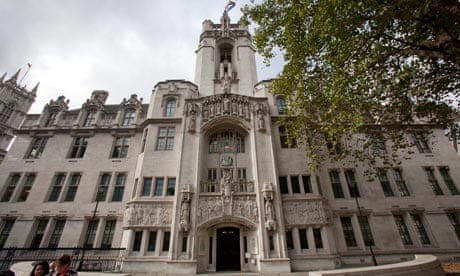Insurers may have to pay out as much as £5bn to relatives of those who have died from asbestos-related cancers following a supreme court judgment that will benefit thousands of families.
At the end of a legal battle that has lasted more than five years, justices at the country's highest court ruled by a four to one majority that insurance companies' liability had been triggered when individuals were exposed to asbestos dust – not when symptoms of the connected condition, mesothelioma, emerged decades later. Some claims date back to the late 1940s. The supreme court ruled that the disease could be said to have been "sustained" or "contracted" – the wording varied between company insurance policies – by an employee in the period when it was caused or initiated, even if it only developed or manifested itself later.
Lord Clarke said: "The negligent exposure of an employee to asbestos during the [insurance] policy period has a sufficient causal link with subsequently arising mesothelioma to trigger the insurer's obligation."
Britain and Ireland's largest trade union, Unite, welcomed the "landmark" ruling, which it said would affect "many of the 2,500 people who are diagnosed with mesothelioma each year". Its challenge was on behalf of the family of Charles O'Farrell, a retired member who died of mesothelioma in 2003.
Lawyers and the insurance industry have estimated the liability at between £600m and £5bn. Municipal Mutual Insurance (MMI), one of the insurance firms that appealed against the compensation ordered by lower courts, said it had already been paying out to local authority employers for mesothelioma claims, despite not being obliged to do so until the outcome of the case was known.
Commenting on the supreme court's decision, the Unite general secretary, Len McCluskey, said: "This is a landmark ruling which will affect thousands of victims of asbestos.
"It is a disgrace that insurance companies went to such lengths to shirk their responsibilities. For callous insurers this means the responsibility holiday is over. Unite fought this case to the highest court to get justice for Charles, his family and all victims of asbestos.
O'Farrell's daughter, Maureen Edwards, said: "All I ever prayed for was the right decision. This is the right decision. My dad worked all his life and was hoping to enjoy retirement before mesothelioma took him away.
"There was never any question about who was to blame – all this long battle was about was insurers wanting to get out of paying. It is very difficult for us to understand the insurance industry's attitude to dying people, an attitude that the government [legal reforms are] going to make worse."
Helen Ashton, from the law firm Irwin Mitchell, who represented the lead claimant in the case, said the ruling provided "clarity, consistency and comfort for mesothelioma victims and their families".
The ruling was welcomed as a "great relief" by Ruth Durham, who had continued the legal battle in memory of her father Leslie Screach. He died in 2003 after being exposed to asbestos fibres between 1963 and 1968 while working as a paint sprayer in west London.
His daughter said: "I was determined to see this through with a positive outcome for all those who, like my dad, suffered so terribly because of someone else's negligence. I miss him every day and no sum of money will ever bring him back or make up for what he went through."
Nick Starling, the Association of British Insurers (ABI) director of general insurance and health, said: "[This] ruling by the supreme court has confirmed what most in the industry have always understood – that the insurer on cover when the claimant was exposed to asbestos should pay the claim, rather than the insurer on cover when the mesothelioma develops.
"This case has been pursued by a small group of 'runoff' insurers acting independently and at odds with the views of the majority of the UK insurance industry. We are pleased that the supreme court has overruled the court of appeal's judgment on this point as it ensures that claimants should get the compensation they reasonably expect."
MMI said it had participated in the joint action to determine the extent of the company's insurance liabilities under policies it wrote in the period up to September 1992 when it ceased writing new insurance business.
